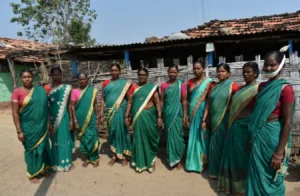Between August 2019 and October 2020, the Deutsche Gesellschaft für Internationale Zusammenarbeit GmbH (GIZ) funded a BCI programme in Maharashtra, India, to engage approximately 140,000 farmers in the Nandurbar, Chandrapur and Nagpur districts.
The programme aimed to promote sustainable environmental and social agricultural practices, with a focus on increasing farmer income through better yields and market connectivity, while also improving environmental and decent work practices.
Case Study: Women’s Self-Help Groups in Chandrapur
Through one of the programme’s workstreams, BCI Implementing Partner Ambuja Cement Foundation (ACF) launched an initiative in the Jiwati block of the Chandrapur district to explore how women’s ‘self-help groups’ could boost women’s incomes through collectively buying cotton and then trading it onwards. The initiative eventually led to 33 self-help groups being set up in the district, with the groups able to benefit from seed capital provided by the local office of the Maharashtra State Rural Livelihood Mission.
One such self-help group was the Jangudevi Women Self-Help Group, who earned a surplus of €1,250 over a three-month period. Read more about their group and this initiative in this first case study from the programme: Sowing the Seeds of Gender Empowerment in Cotton Value Chains of Maharashtra.

Image ©GIZ | One of the women’s groups set up in Chandrapur district.
We will be releasing further case studies from the GIZ-funded programme in the coming weeks and months.







































